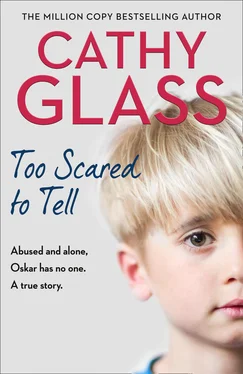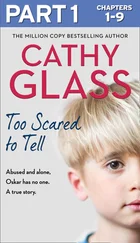‘Would you like to push the trolley?’ I asked Oskar. Most children love being in charge of a supermarket trolley, sometimes to the detriment of other shoppers! Oskar shook his head, but he was content to walk beside me as we went up and down the aisles.
‘Tell me if you see anything you fancy,’ I said. It’s not an invitation I would offer to some children, as we would end up with a trolley full of crisps, sweets, biscuits and Pot Noodles. Oskar didn’t make any suggestions at all.
The supermarket, like many, had plenty of counters displaying food from other countries and I pointed these out to Oskar and lingered by them, hoping he would spot something he liked, but he didn’t. He wasn’t interested and remained thoughtful. When we got to the bread counter, I asked him if he could see any of the rolls he had for breakfast at home. Without any enthusiasm, he took a bag of sourdough bread rolls with seeds on and passed them to me. ‘Good. What would you like to go in them?’
He shrugged. ‘Don’t mind.’
I thought that once his social worker had spoken to his mother, I’d have a better idea of Oskar’s likes and dislikes. All I knew at present was what Oskar’s uncle had told Andrew: that Oskar didn’t have any food allergies or special dietary requirements. But all children have food preferences, which I try to accommodate within reason. For now, however, I bought the rolls and some more ham and cheese filling, as well as the other items we needed. Oskar remained quiet and pensive as we completed the shop, and afterwards, when we were in the car going home, I asked him if there was anything wrong, but he shook his head. Then, as I drove, he suddenly asked, ‘Will I have to have another medical?’
‘Possibly in the future. Most children do, but it’s nothing to worry about.’
‘I don’t like taking off my clothes,’ he said.
‘I know.’ I glanced at him in the rear-view mirror. ‘Why?’
Silence. He was staring out of his window and frowning.
‘Is there any reason you don’t like undressing?’ I asked him. ‘We all have to undress sometimes, to shower, go swimming or when we see a doctor.’
There was a long silence and then he said again, ‘I don’t like taking off my clothes.’
‘I know, you said. Is there a reason?’ There was no reply and so the matter was dropped.
Oskar and I were the only ones in when we arrived home, apart from Sammy, who, hearing us, had shot in through the cat flap in the kitchen, startling Oskar. I was unpacking the shopping and Oskar had been standing to one side, watching me. I noticed he didn’t let me far out of his sight. Sammy began meowing loudly for his dinner. ‘Would you like to feed him?’ I asked Oskar.
He nodded.
I broke off from unpacking the groceries, took the bag of dry cat food from the cupboard and gave the scoop to Oskar. ‘Just one scoop,’ I said. ‘Place it in his food bowl.’
Oskar fed Sammy and then watched him eat, while I finished unpacking the shopping.
‘I bought you some new clothes, and there’s a present for you on your bed,’ I said to Oskar.
I was expecting some form of positive reaction, but to my astonishment he said, ‘I don’t want it.’
‘But you haven’t seen what it is yet,’ I said, smiling.
He looked at me, wide-eyed and wary, as he often was.
‘Do you want to go up and see what it is?’
He shook his head.
‘OK, shall I bring it down?’ Some children don’t like going upstairs by themselves, and the house was still strange to him.
He didn’t reply, so I went upstairs and brought down the teddy bear, which was still in the store bag. ‘I hope you like it,’ I said, handing it to him.
I might have been giving him hot coals for all the trepidation he showed in opening the bag. He gingerly parted the top, peered inside and looked at me.
‘It won’t bite. It’s a cuddly teddy bear,’ I said, stating the obvious. ‘With lovely soft fur. We could sit him at your place at the table,’ I suggested.
He handed me the bag, so I assumed he was in agreement, and I sat the bear in the chair next to Adrian’s. He watched me warily but didn’t say anything. ‘You’ll have to think of a name for him,’ I suggested.
‘Luka,’ he said.
‘That’s a nice name.’
‘It’s my brother’s.’
‘Brother?’ I asked, astonished. There had been no mention of a brother.
‘Where does he live?’ I wondered if Andrew knew of the existence of Oskar’s brother, which could raise further child-protection issues.
Oskar just looked at me.
‘Does your brother live with you?’ I asked.
He shook his head.
‘Where is he?’
‘With my aunt.’
‘Where?’
He shrugged.
‘How old is Luka? Do you know?’
‘Twelve.’
‘Do you have any other brothers or sisters?’
He shook his head again.
‘OK, just sit at the table for a minute and do a puzzle,’ I said. ‘I have to make a phone call. I won’t be long. I’ll be in the hall.’ I took some puzzles from the toy cupboard and placed them on the table. I needed to tell Oskar’s social worker what he’d said, for I felt sure Andrew would have told me if he was aware Oskar had a brother. It was important he knew as soon as possible, as it’s generally felt that if one child in a family is at risk of harm then other siblings could be too, so normally it’s investigated as a matter of urgency.
Andrew answered straight away. ‘It’s Cathy Glass, Oskar’s carer.’
‘Hello, I was going to phone you to arrange to see you tomorrow. Is everything all right?’
‘Yes, Oskar had his medical. But I thought you should know, he’s just told me he has a brother, Luka, aged twelve, apparently living with an aunt, I’m not sure where.’
‘Yes, I’ve only just found out. I managed to speak to his mother this afternoon and she is with Luka now in —’ He named the country they originally came from. ‘Sorry, I’m in a hurry now, I’ve got to place a child with carers. Can I visit you and Oskar tomorrow after school? I’ll explain then.’
‘Yes, we’ll be home by four o’clock.’
‘Thank you.’
He said a quick goodbye and I returned to the kitchen-diner to find Oskar at the table doing the puzzle, but he had moved seats, so he was now sitting next to where Lucy sat at meal times, rather than Adrian. I didn’t say anything; it didn’t matter. I praised him for doing the puzzle nicely, then set about making dinner for when everyone came home. I could see Oskar seated at the table from where I worked in the kitchen, and every so often he glanced at me, then he asked in a small voice, ‘Can I sit here?’
‘Yes, if you want to. Don’t you want to sit next to Adrian?’ Most boys we fostered thought it was a huge privilege to sit next to Adrian and spend time with him. Often, they bonded with him first. Adrian was tall like his father, but gentle, sensitive, patient and a good role model for boys. His long-term girlfriend Kirsty was lovely too and worked as a primary school teacher.
Oskar hadn’t replied, so I continued to prepare dinner and then laid the table. Paula was in first and I explained to her that Oskar would prefer to sit in her place next to Lucy, and of course she didn’t mind and was happy to sit anywhere. We all had dinner together shortly after six o’clock and Oskar enjoyed the spaghetti bolognaise, although I noticed him occasionally stealing glances at Adrian as we ate. Once we’d finished, I listened to Oskar read his school book – his teacher expected him to read each evening – while Adrian, Lucy and Paula did their own thing. After he’d read, I asked him if he wanted to play a board game, but he didn’t, so I read him some stories and then began his bath and bedtime routine.
Читать дальше












